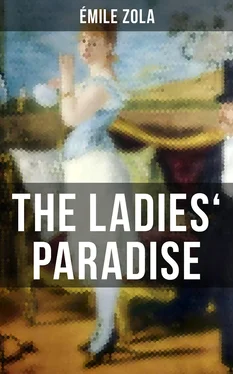“It’s the Valenciennes for my daughter,” said she. “It’s an inch and a half wide. Isn’t it delicious? One franc eighteen sous.”
The lace was passed from hand to hand. The ladies were astonished. Mouret assured them he sold these little trimmings at cost price. However, Madame Marty had closed the bag, as if to conceal certain things she could not show. But after the success obtained by the Valenciennes she was unable to resist the temptation of taking out a handkerchief.
“There was this handkerchief as well. Real Brussels, my dear. Oh! a bargain! Twenty francs!”
And after that the bag became inexhaustible, she blushed with pleasure, a modesty like that of a woman undressing herself made her appear more charming and embarrassed at each fresh article she took out. There was a Spanish blonde-lace cravat, thirty francs: she didn’t want it, but the shopman had sworn it was the last, and that in future the price would be raised. Next came a Chantilly veil: rather dear, fifty francs; if she didn’t wear it she could make it do for her daughter.
“Really, lace is so pretty!” repeated she with her nervous laugh. “Once I’m inside I could buy everything.”
“And this?” asked Madame de Boves, taking up and examining a remnant of Maltese lace.
“That,” replied she, “is for an insertion. There are twenty-six yards—a franc the yard. Just fancy!”
“But,” said Madame Bourdelais, surprised, “what are you going to do with it?”
“I’m sure I don’t know. But it was such a funny pattern!”
At this moment she raised her eyes and perceived her terrified husband in front of her. He had turned paler than usual, his whole person expressed the patient, resigned anguish of a man assisting, powerless, at the reckless expenditure of his salary, so dearly earned. Every fresh bit of lace was for him a disaster; bitter days of teaching swallowed up, long journeys to pupils through the mud devoured, the continued effort of his life resulting in a secret misery, the hell of a necessitous household. Before the increasing wildness of his look, she wanted to catch up the veil, the cravat, and the handkerchief, moving her feverish hands about, repeating with forced laughter: “You’ll get me a scolding from my husband. I assure you, my dear, I’ve been very reasonable; for there was a fine piece of point at five hundred francs, oh! a marvel!”
“Why didn’t you buy it?” asked Madame Guibal, calmly. “Monsieur Marty is the most gallant of men.”
The poor professor was obliged to bow and say his wife was perfectly welcome. But the idea of this point at five hundred francs was like a lump of ice dripping down his back; and as Mouret was just at that moment affirming that the new shops increased the comfort of the middle-class households, he glared at him with a terrible expression, the flash of hatred of a timid man who would have throttled him had he dared.
But the ladies had still kept hold of the bits of lace, fascinated, intoxicated. The pieces were unrolled, passed from one to the other, drawing the admirers closer still, holding them in the delicate meshes. On their laps there was a continual caress of this tissue, so miraculously fine, and amidst which their culpable fingers fondly lingered. They still kept Mouret a close prisoner, overwhelming him with fresh questions. As the day continued to decline, he was now and again obliged to bend his head, grazing their hair with his beard, to examine a stitch, or indicate a design. But in this soft voluptuousness of twilight, in the midst of this warm feminine atmosphere, Mouret still remained their master beneath the rapture he affected. He seemed to be a woman himself, they felt themselves penetrated and overcome by this delicate sense of their secret that he possessed, and they abandoned themselves, captivated; whilst he, certain from that moment to have them at his mercy, appeared, brutally triumphing over them, the despotic monarch of dress.
“Oh, Monsieur Mouret!” stammered they, in low, hysterical voices, in the gloom of the drawing-room.
The last rays of the setting sun were dying away on the brass-work of the furniture. The laces alone retained a snowy reflex on the dark dresses of the ladies, of which the confused group seemed to surround the young man with a vague appearance of kneeling, worshipping women. A light still shone on the side of the silver teapot, a short flame like that of a night-light, burning in an alcove warmed by the perfume of the tea. But suddenly the servant entered with two lamps, and the charm was destroyed. The drawing-room became light and cheerful. Madame Marty was putting her lace in her little bag, Madame de Boves was eating a sponge cake, whilst Henriette who had got up, was talking in a half-whisper to the baron, near one of the windows.
“He’s a charming fellow,” said the baron.
“Isn’t he?” exclaimed she, with the involuntary cry of a woman in love.
He smiled, and looked at her with a paternal indulgence. This was the first time he had seen her so completely conquered; and, too proud to suffer from it, he experienced nothing but a feeling of compassion on seeing her in the hands of this handsome fellow, so tender and yet so cold-hearted. He thought he ought to warn her, and murmured in a joking tone: “Take care, my dear, or he’ll eat you all up.”
A flash of jealousy lighted up Henriette’s eyes. Perhaps she understood Mouret had simply made use of her to get at the baron; and she determined to render him mad with passion, he whose hurried style of making love had the easy charm of a song thrown to the four winds of heaven. “Oh,” said she, affecting to joke in her turn, “the lamb always finishes up by eating the wolf.”
The baron, greatly amused, encouraged, her with a nod. Could she be the woman who was to avenge all the others?
When Mouret, after having reminded Vallagnosc that he wanted to show him his machine at work, came up to take his leave, the baron retained him near the window opposite the gardens, now buried in darkness. He yielded at last to the seduction; his confidence had come on seeing him in the midst of these ladies. Both conversed for a moment in a low tone, then the banker said: “Well, I’ll look into the affair. It’s settled if your Monday’s sale proves as important as you expect.”
They shook hands, and Mouret, delighted, took his leave, for he did not enjoy his dinner unless he went and gave a look at the day’s receipts at The Ladies’ Paradise.
Конец ознакомительного фрагмента.
Текст предоставлен ООО «ЛитРес».
Прочитайте эту книгу целиком, купив полную легальную версию на ЛитРес.
Безопасно оплатить книгу можно банковской картой Visa, MasterCard, Maestro, со счета мобильного телефона, с платежного терминала, в салоне МТС или Связной, через PayPal, WebMoney, Яндекс.Деньги, QIWI Кошелек, бонусными картами или другим удобным Вам способом.












